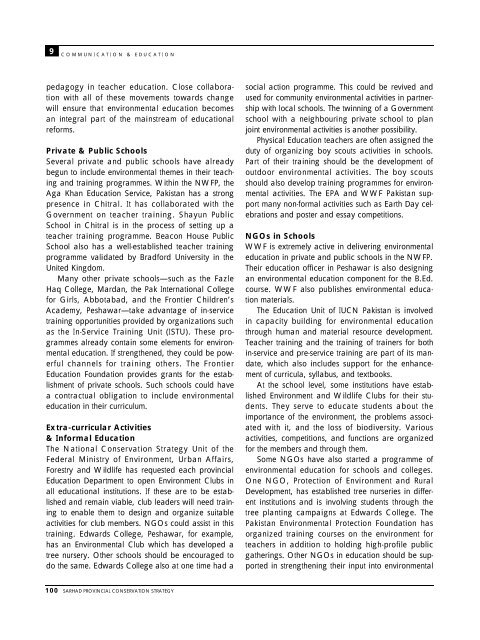Sarhad Provincial Conservation Strategy - IUCN
Sarhad Provincial Conservation Strategy - IUCN
Sarhad Provincial Conservation Strategy - IUCN
Create successful ePaper yourself
Turn your PDF publications into a flip-book with our unique Google optimized e-Paper software.
9<br />
C O M M U N I C A T I O N & E D U C A T I O N<br />
pedagogy in teacher education. Close collaboration<br />
with all of these movements towards change<br />
will ensure that environmental education becomes<br />
an integral part of the mainstream of educational<br />
r e f o r m s .<br />
Private & Public Schools<br />
Several private and public schools have already<br />
begun to include environmental themes in their teaching<br />
and training programmes. Within the NWFP, the<br />
Aga Khan Education Service, Pakistan has a strong<br />
presence in Chitral. It has collaborated with the<br />
Government on teacher training. Shayun Public<br />
School in Chitral is in the process of setting up a<br />
teacher training programme. Beacon House Public<br />
School also has a well-established teacher training<br />
programme validated by Bradford University in the<br />
United Kingdom.<br />
Many other private schools—such as the Fazle<br />
Haq College, Mardan, the Pak International College<br />
for Girls, Abbotabad, and the Frontier Children’s<br />
Academy, Peshawar—take advantage of in-service<br />
training opportunities provided by organizations such<br />
as the In-Service Training Unit (ISTU). These programmes<br />
already contain some elements for environmental<br />
education. If strengthened, they could be powerful<br />
channels for training others. The Frontier<br />
Education Foundation provides grants for the establishment<br />
of private schools. Such schools could have<br />
a contractual obligation to include environmental<br />
education in their curriculum.<br />
Extra-curricular Activities<br />
& Informal Education<br />
The National <strong>Conservation</strong> <strong>Strategy</strong> Unit of the<br />
Federal Ministry of Environment, Urban Affairs,<br />
Forestry and Wildlife has requested each provincial<br />
Education Department to open Environment Clubs in<br />
all educational institutions. If these are to be established<br />
and remain viable, club leaders will need training<br />
to enable them to design and organize suitable<br />
activities for club members. NGOs could assist in this<br />
training. Edwards College, Peshawar, for example,<br />
has an Environmental Club which has developed a<br />
tree nursery. Other schools should be encouraged to<br />
do the same. Edwards College also at one time had a<br />
100 SARHAD PROVINCIAL CONSERVATION STRATEGY<br />
social action programme. This could be revived and<br />
used for community environmental activities in partnership<br />
with local schools. The twinning of a Government<br />
school with a neighbouring private school to plan<br />
joint environmental activities is another possibility.<br />
Physical Education teachers are often assigned the<br />
duty of organizing boy scouts activities in schools.<br />
Part of their training should be the development of<br />
outdoor environmental activities. The boy scouts<br />
should also develop training programmes for environmental<br />
activities. The EPA and WWF Pakistan support<br />
many non-formal activities such as Earth Day celebrations<br />
and poster and essay competitions.<br />
NGOs in Schools<br />
WWF is extremely active in delivering environmental<br />
education in private and public schools in the NWFP.<br />
Their education officer in Peshawar is also designing<br />
an environmental education component for the B.Ed.<br />
course. WWF also publishes environmental education<br />
materials.<br />
The Education Unit of <strong>IUCN</strong> Pakistan is involved<br />
in capacity building for environmental education<br />
through human and material resource development.<br />
Teacher training and the training of trainers for both<br />
in-service and pre-service training are part of its mandate,<br />
which also includes support for the enhancement<br />
of curricula, syllabus, and textbooks.<br />
At the school level, some institutions have established<br />
Environment and Wildlife Clubs for their students.<br />
They serve to educate students about the<br />
importance of the environment, the problems associated<br />
with it, and the loss of biodiversity. Various<br />
activities, competitions, and functions are organized<br />
for the members and through them.<br />
Some NGOs have also started a programme of<br />
environmental education for schools and colleges.<br />
One NGO, Protection of Environment and Rural<br />
Development, has established tree nurseries in different<br />
institutions and is involving students through the<br />
tree planting campaigns at Edwards College. The<br />
Pakistan Environmental Protection Foundation has<br />
organized training courses on the environment for<br />
teachers in addition to holding high-profile public<br />
gatherings. Other NGOs in education should be supported<br />
in strengthening their input into environmental

















